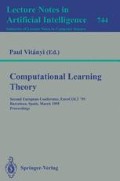Abstract
We raise the following problem: in a probabilistic context, is it always fruitful for a machine to compute probabilities? The question is made precise in a paradigm of the limit-identification kind, where a learner must discover almost surely whether an infinite sequence of heads and tails belongs to an effective subset S of the Cantor space. In this context, a successful strategy for an ineffective learner is to compute, at each stage, the conditional probability that he is faced with an element of S, given the data received so far. We show that an effective learner should not proceed this way in all circumstances. Indeed, even if he gets an optimal description of a set S, and even if some machine can always compute the conditional probability for S given any data, an effective learner optimizes his inductive competence only if he does not compute the relevant probabilities. We conclude that the advice “compute probabilities whenever you can” should sometimes be received with caution in the context of machine learning.
We thank Scott Weinstein, Michiel van Lambalgen, and several anonymous reviewers for helpful comments. Research support was provided by the Office of Naval Research under contracts Nos. N00014-87-K-0401 N00014-89-J-1725, by the Swiss National Science Foundation under grant number 21-32399.91, and by the Centre National de la Recherche Scientifique.
Preview
Unable to display preview. Download preview PDF.
References
Billingsley, P.: Probability and Measure. John Wiley & Sons, second edition (1986)
Osherson, D., Weinstein, S., de Jongh, D. and Martin, E.: Formal Learning Theory. Van Bentham, J. and ter Meulen, A. editors. Handbook of Logic and Language. Elsevier (1994)
Earman, J.: Bayes or Bust? MIT Press (1992)
Enderton, H.: Recursion Theory. Barwise, J. editor. Handbook of Mathematical Logic. North Holland (1977) 527–566
Hinman, P.: Recursion-Theoretic Hierarchies. Perspectives in Mathematical Logic, Omega Series. Springer-Verlag (1978)
Kelly, K.: The Logic of Reliable Inquiry. MIT Press (1994)
Levy, A.: Basic Set Theory. Springer-Verlag (1979)
Osherson, D., Stob, M. and Weinstein, S.: Systems that Learn: An Introduction to Learning Theory for Cognitive and Computer Scientists. MIT Press (1986)
Pearl, J.: Probabilistic Reasoning in Intelligent Systems: Networks of plausible inference. Morgan-Kaufmann (1988)
Schervish, M. and Seidenfeld, T.: An Approach to Consensus and Certainty with Increasing Evidence. Journal of Statistical Planning and Inference 25 (1990) 401–414
Author information
Authors and Affiliations
Editor information
Rights and permissions
Copyright information
© 1995 Springer-Verlag Berlin Heidelberg
About this paper
Cite this paper
Martin, E., Osherson, D. (1995). A note on the use of probabilities by mechanical learners. In: Vitányi, P. (eds) Computational Learning Theory. EuroCOLT 1995. Lecture Notes in Computer Science, vol 904. Springer, Berlin, Heidelberg. https://doi.org/10.1007/3-540-59119-2_183
Download citation
DOI: https://doi.org/10.1007/3-540-59119-2_183
Published:
Publisher Name: Springer, Berlin, Heidelberg
Print ISBN: 978-3-540-59119-1
Online ISBN: 978-3-540-49195-8
eBook Packages: Springer Book Archive

